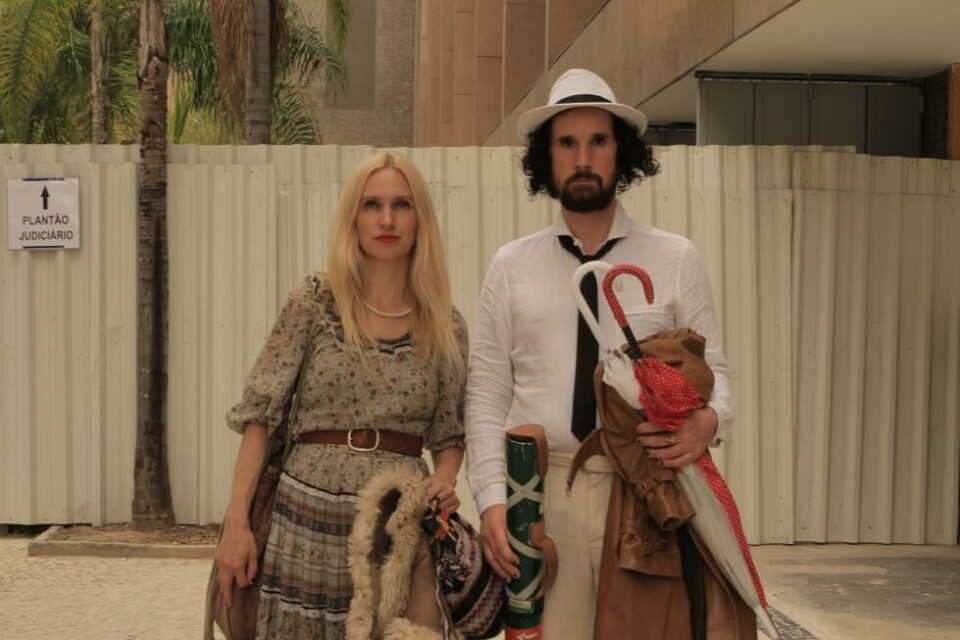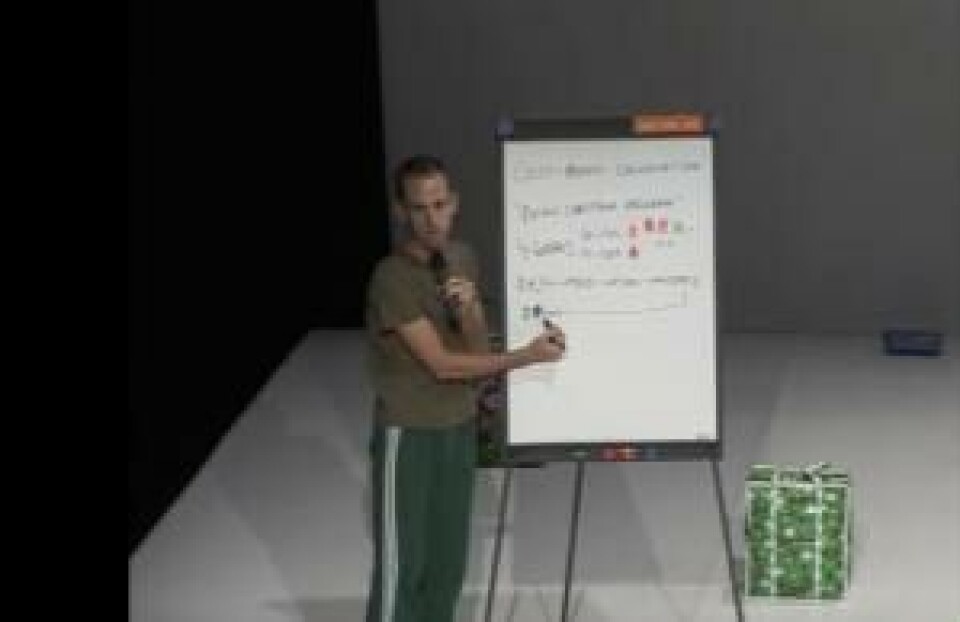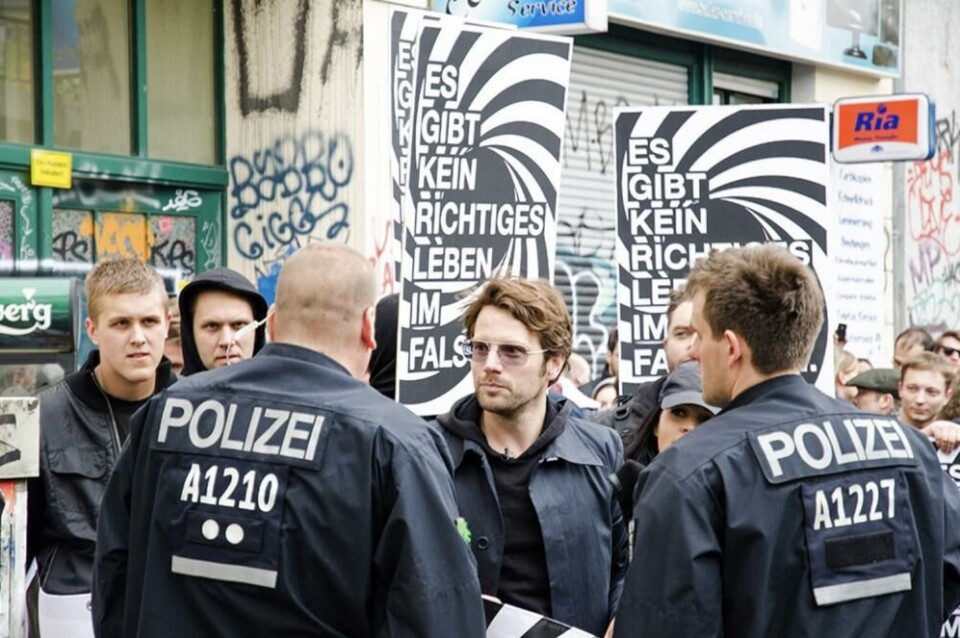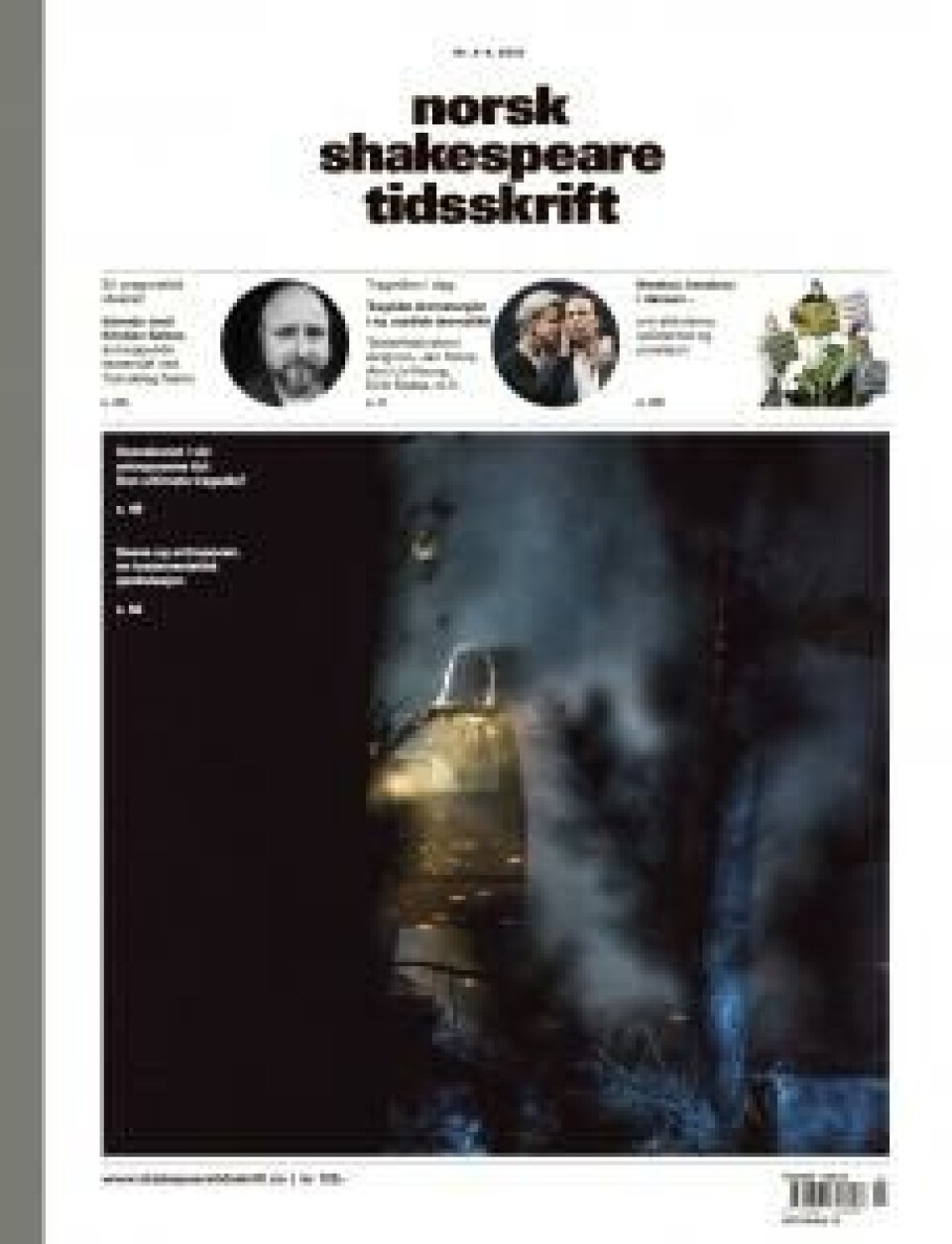
The Artist is Capitalism’s Best Fiend
Nettsted Bonus: ENGLISH VERSION For the artist, capitalism is a difficult enemy: we participate, selling our creations. Artistic capitalism-critique has even been used to enforce a new spirit of capitalism. What to do? Press criminal charges against ourselves? Exhibit our self-exploitation? Sell the revolution?!
Many of us performance artists exhibit our own behavior in order to criticize capitalist society. Capitalism is the worldwide dominating economical system; it is almost impossible to survive outside this order. In other words, most of us are, partly, products of capitalism. That means, there are good artistic reasons to broach the issue of oneself, when criticizing capitalist society. Artists are not only products or even victims of capitalism. We also play a part in establishing and renewing it.
No Money, No Love
In his 2007 lecture performance No Money, No Love, German choreographer and dancer Jochen Roller does a cost-profit-calculation. He analyzes what he earns - or perhaps rather loses - making his dance-performances. Taking rehearsals, preparation and the loss of better paid working hours into account, the result is: he has to pay 60 euros per minute for his self-produced dance piece Being Christina Aguilera. He then ironically calculates a «self-exploitation factor» and dances one minute of the Aguilera-performance he just analyzed economically. One can say, he performs his self-exploitation. And thus makes the audience responsible. Through their very presence the viewers, who have paid ordinary tickets, get the chance to understand what the prices of these tickets imply for the artist in a neo-liberal society with little support for the arts. The performer-audience-relationship he stages, is exemplary for the employee-costumer-relationship in the service sector. Maybe it’s not an incident that one talks about the employee’s «sales performance»? It’s characteristic of both the service sector and the performing arts to sell feelings, thoughts and body movements. Often underpriced. As the case is, for instance, for the staff in many hotels. Or for Roller, being Christina Aguilera. By exhibiting this sale-situation, Roller does not only problematize the fact of being underpaid. He also criticizes the conditions of being implicated, through body, mind and emotions, in commercial structures, transforming oneself into a commodity.
But artists do not only participate in capitalism by exploiting themselves. Paradoxically, even while criticizing it, we can enforce it. And in some cases precisely then. The French sociologists Eve Chiapello and Luc Boltanski were one of the first theorists exploring these dilemmas, in their 1999 book The New Spirit of Capitalism. In the 1970’s artists criticized capitalism for producing inauthenticity, and this very critique helped capitalism to create a market for «authentic» commodities, for instance a trip to untouched nature. Artists also provided a model for how to live a productive life in today’s project-based capitalism: our flexible, creative, off-the-record lifestyle has become a paradigm for work in post-Fordist capitalism, exchanging security with autonomy or rather, instability. The disappearance of the division between work and life that is so characteristic of this type of capitalism, is in an emphasized way characteristic of artistic work. Many artists identify themselves with their work to such a degree that it is exercised as if it wasn’t even work at all. We’re sacrificing our spare time. This model is of course attractive for capitalism, where the obsession of creating maximal profit dominates. In the 2015 book The Artist at Work, German-Slovenian philosopher and performance theorist Bojana Kunst claims that «the proximity of art and capitalism» makes it very difficult for the artist to be political and thus to criticize the economic system. The idea that one cannot condemn what oneself is participating in, seems to be the premise for such a skepticism.
Product of Circumstances

Having empowered capitalism and even delivered a working model for it, we can not only talk about ‘the others’ when criticizing it. We have to talk about our own role. Perhaps this is also an answer to Bojana Kunst’s pessimism: being self-critical could re-enable artists to formulate a capitalism criticism, even if we don’t stand outside the criticized structures. From the very origin of the lecture-performance-genre this self-critical approach has been crucial. In his pioneer work, Product of Circumstances, Xavier Le Roymentions how he, paradoxically, lost his critical integrity as soon as he had his first (commercial) success with critical art. A catch 22 that he exhibits in his lecture performance, exemplifying the difficult situation of artistic capitalism criticism. Shortly after, Le Roy is dancing like a robot. I interpret this as an artistic representation of being torn between personal freedom (of dancing one’s own choreography) and the alienating demands (of a capitalist society-machine).
In both No Money, No Love and Product of Circumstances the artists exhibit themselves acting in post-Fordist capitalism. Doing so is their capitalist critical strategy. But they don’t come up with alternatives. The problems are diagnosed, but no solutions are formulated. One can interpret this as a fatalist position, without faith in changing something within the capitalist society. This position can also be expressed by German philosopher Theodor W. Adorno’s famous 1951 statement, «there is no right life in the wrong one.» Applied to the subject of my essay, Adorno’s claim would mean, ‘the capitalist society produces injustice, inauthenticity and inequality – but we cannot change it from within. We can only point out the problem. But as long as this system exists, we participate, if we want to or not.’
Right Life in The Wrong One
Are there performance artists who suggest concrete ways of changing – or even ending – the capitalist society?
German designer, theorist and artist Friedrich von Borries has a project called RLF. The acronym stands for«trichtiges Leben im Falschen» («right life in the wrong one»). What Adorno rejects is here literally affirmed. Is von Borries the artist who can tell us how to change the wrong society from within? In 2013, at the festival re-publica in Berlin, von Borries tried to convince the audience to become the «shareholders of the revolution». During his lecture performance he showed a video of the German social psychologist Harald Welzer criticizing Adorno’s statement. Welzer disapproves of intellectuals who have chosen «there is no right life in the wrong one» as their life-motto, or maybe as a bad excuse. According to him they understand the wrongness of society, but claim that change only is possible on a structural, not on an individual level. A vicious circle, resulting in comfortable resignation, that allows individuals to enjoy the wrong life. The social psychologist suggests rather to live a «more right» life in the wrong one, changing the things one actually can. Von Borries uses Welzer’s conclusion as his starting point. But what is the strategy of the RLF-project? And does it really fulfill the promise of living a «more right» life in the wrong one, changing the capitalist society from within?
The main idea is as surprising as it is paradoxical. Being a commercial designer von Borries, like the advertising industry as a whole, is familiar with producing new desires in his costumers, since new desires can be satisfied by new commodities. In this project, however, von Borries wants to create a revolutionary desire, i.e. nothing less than the desire to end capitalist society. And if one has enough money, one can even buy this new object of desire; the anti-capitalistic revolution, in the form of shares. Or in the form of physical objects that concretely and literally hint to this anti-capitalist revolution to come. He promotes expensive designer furniture, items that have an inherent, intended value-losing factor. For instance, a table covered with expensive gold foil that isn’t sealed. After a while in use in the rich person’s house, the gold foil will inevitably fall off and the underlying message literally reveals itself: «don’t be afraid».
Von Borries’ dream customer knows about this loss of value, but buys the object nevertheless. The artist hopes to sell revolutionary consciousness and prepare the hegemonic, wealthy segment of society, who actually can afford these objects, for a society without capital accumulation. He doesn’t only address the economic hegemony, but also the intellectual, transforming revolutionary consciousness in itself into a currency. With the best and most liked anti-capitalist arguments in an auction race on RLF’s social media debate forums, one can buy a trendy, value-losing RLF-sport shoe.
Show You’re Not Afraid: Go Shopping

Half a year later von Borries is holding another lecture performance. Here he gives the audience important hints and updates. He still tries to sell the revolution. But he reveals another meaning of the acronym RLF: «real life fiction.» Obviously, the project is partly fiction. The many fantastic stories he tells about the RLF-marketing also point in that direction. In addition, von Borries informs us about the origin of the sentence «don’t be afraid», the aforementioned anti-capitalist message that often shows up in the revolutionary objects he’s selling. It’s inspired by the former mayor of New York Rudy Giuliani. Following the terror attacks 9/11, Giuliani proclaimed to New Yorkers: «Show you’re not afraid. Go shopping.» Is it not the revolution, but rather the joy of shopping, that is the final (self-ironic) goal in von Borries’ project? In his second lecture performance, von Borries no longer claims that the intention of RLF is to live a «more right» life in the wrong one. His project, that at first glance seemed to propose an alternative to Adorno’s statement, is maybe just affirming it, he now says. This information sheds a new light on RLF: suddenly the project seems rather to be a comment, a parody of the capitalist society. It no longer seems to be von Borries’ intention to end capitalism by selling the revolution.
I’m not categorically denying the possibility of realizing von Borries’ paradoxical anti-capitalist revolution. If the strategy turns out to function one day, other interpretations have to be made, taking the explicit goal of the project seriously instead of perceiving it ironically. In the meantime, one can ask, if the fact that value, for instance gold, is added to the RLF-products just to be destroyed, has revolutionary potential at all. Or if it is rather the ultimate expression of late capitalist decadence and cynicism? Interpreting the project as a satirical image of the new spirit of capitalism, as I do at second glance, RLF can be said to be an artistic way of expressing a thesis concerning capitalist criticism. Namely, Chiapello and Boltanski’s thesis that capitalism can use criticism to develop even more commodities, since it utters what people, potential customers, crave for. For instance, as mentioned earlier, “authentic” commodities. The most extreme consequence of this thought would be that capitalism can sell even the most anti-capitalist revolution.
This interpretation doesn’t dismiss the project of von Borries. On the contrary: it shows that it is an original comment on existing perverse capitalist strategies. But despite the goal he claims to have, von Borries can’t give a positive suggestion of how to change - or even end - capitalism. Just like Roller and Le Roy he is exhibiting, and implicitly criticizing, the status quo of the wrong capitalist society he himself is involved in.
The Personal Encounter with World Politics
In an ongoing performance series that my partner Edy Poppy and I are creating, the initial point is one of a personal experience. Christmas Eve 2015 my family and I were in Rio de Janeiro on holiday. We went out in the evening and were assaulted and robbed by two armed men from a favela. We assume that the real reasons for the assault is poverty, caused by the unjust distribution of common global goods. And that the upper and middle classes are co-responsible for this unjust distribution. Being ourselves part of the middle class, Edy Poppy and I ended up turning the guilt-question on its head. In the first part of the series, The Criminal Complaint Performance, at Sørlandets Art Museum in Norway 9th of May 2018, we founded a law against structural violence. Then we made a calculation estimating the unhappiness the two assaulters and we have caused in each other’s lives. We also took into account the irony that both Edy Poppy and my careers have thrived thanks to the cultural capital gained by the assault. This article is one of many examples of that.
The estimated result of the calculation we did in this lecture performance was as follows. In the first place, i.e. before the assault, we had caused unhappiness in the lives of the two men from the favela, by supporting the 2014 World Cup in Brazil, watching it on TV. The mega event had negative effects for the very poor: favela houses were removed, social programs cancelled. Then, by assaulting us in 2015, they produced unhappiness in our lives. As a consequence, they were caught by the police and probably went to jail, whereas I began a well-paid PhD-program, wrote several articles and, together with Edy Poppy, started the aforementioned performance-series, The Personal Encounter with World Politics, on the background of the assault. In other words, we earned both cultural and economic capital, by ‘selling’ our trauma. The final result of the calculation made us estimate that we had produced more unhappiness in our assaulter’s lives than they in ours. We estimated that we ourselves had broken the law we just had founded and thus pressed charges against ourselves for having committed structural violence against the underclasses, represented by the two men.
Then we went on an investigation journey to Rio de Janeiro, trying to find proofs against ourselves. In a 2018 Interim Report Performance, 25th of August at Museu de Arte do Rio (MAR), 15th of September at Fjaler Theatre Festival, 28th of September at University of Agder and 23rd of November at Kristiansand Art Hall, we presented the results of our investigation. In this lecture performance we were able to verify some of our assessments, for instance the estimated connection between criminality and the 2014 World Cup. Other things were a bit different than we thought. We found out that one of the men hadn’t been imprisoned, since he was under-aged. We interpreted that positively: a minimum of civil rights also counts for the very poor. But the other man was jailed for two years, before being released on parole. He didn’t follow the procedures, and is now on the run. We nevertheless had the opportunity to go inside the prison where he was once held, seeing what he had seen. There were a myriad of proverbs on the walls. From the Bible, Buddha, African tribes. Among the proverbs by religious leading lights we also found a portrait and a quote by Steve Jobs: «Each dream you leave behind is a part of your future that will no longer exist.» One of the first things I got from my university when I started my PhD was a MacBook Pro. Once more I was seduced into supporting the spiritual leader of digitalized capitalism. The assault is central to my PhD. It isn’t absurd to say, our assaulter gave me a new MacBook Pro and I gave him a motto by Steve Jobs. Capitalism is distributing it’s dreams very equally but not the means to make them real. Big companies offer their dream images to the poor through commercials on TV, enormous banners hanging behind planes that also fly over the favelas, even if the poor have no chance of ever buying their products. That’s one of the reasons why the poor don’t only steal food but also, for instance, expensive items from Apple. With his stoic-career-gaze next to his “wise” words on the prison wall, Jobs must have produced a dream in our assaulter, without telling him how to afford what the dream promises. What other than eternal access to apple products can Steve Jobs’ face and «proverb» stand for, in the eyes of an underprivileged? By being part of Apple’s costumer gang, I supported the attempt to give our assaulter a dream but not the means to fulfill it.
The Trial Against Ourselves
Edy Poppy and I also criticize capitalism by exhibiting our own complicity with it. Firstly, by pointing at our own participation in globalized, capitalist violent structures. Secondly, by problematizing the paradoxical conditions of our own criticism. As privileged individuals, we can even turn an assault against ourselves into cultural and economic capital. With an artistic project, criticizing capitalism! It is not in itself wrong that we can transform an armed robbery against us into a performance-series. But if one compares this to the probable lack of such a possibility for the two men, for instance by getting access to a similar education and resources as I have had access to, absurd inequalities in globalized capitalism become visible.
Do Edy Poppy and I, inspired by Roller, Le Roy and von Borries, only use our own experiences in order to criticize the capitalist status quo? Or do we also offer concrete suggestions of how to change capitalism? In our project the law against structural violence points towards a better, less aggressive capitalist society. But one could criticize that a law in an art project has no significance, since it has no real consequences. The wish to suggest a modification of the existing capitalist reality, leads us to think about what those consequences might be. To focus on unjust structures should not lead to the rejection of individual guilt. Put it like this: If no one lives a right life, it will definitely not cease to be wrong. The law against structural violence should lead to mandatory analyses revealing who is actually profiting from the structures and who is suffering from them. In order not only to criticize capitalism but also to suggest a serious addendum, it might be appropriate to set a precedent and take the consequences in our lives of having founded a law, pressed criminal charges and found proofs against ourselves. How these consequences will manifest, will be staged in our next performance The Trial Against Ourselves.

